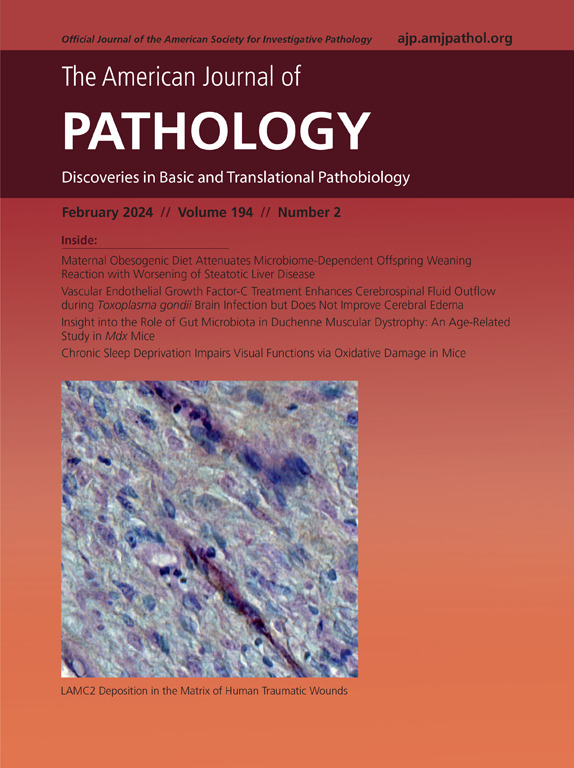Intestinal Dysbacteriosis Contributes to Persistent Cognitive Impairment after Resolution of Acute Liver Failure
IF 4.7
2区 医学
Q1 PATHOLOGY
引用次数: 0
Abstract
Regulating the gut microbiota alleviates hepatic encephalopathy (HE). Whether it is imperative to withhold treatment for microbial imbalance after liver functional recovery remains unclear. The aim of this work was to elucidate the alterations in cognitive behavior, liver function, synaptic transmission, and brain metabolites in acute liver failure (ALF) mice before and after hepatic function recovery. Towards this end, thioacetamide was injected intraperitoneally to establish an ALF mouse model, which induced HE. Hierarchical clustering analysis indicated that while the liver functions normalized, cognitive dysfunction and intestinal dysbacteriosis occurred in the ALF mice 14 days after thioacetamide injection. In addition, fecal microbiota transplantation from the ALF mice with liver function recovery induced liver injury and cognitive impairment. Alterations in synaptic transmission were found in the ALF mice with liver function improvement, and the correlations between the gut bacteria and synaptic transmission in the cortex were significant. Finally, apparent alterations in the brain metabolic profiles of the ALF mice were detected after liver function improvement by performing 1H nuclear magnetic resonance spectroscopy, suggesting a risk of HE. These results showed that intestinal dysbacteriosis in ALF mice with liver function recovery is sufficient to induce liver injury and cognitive impairment. This indicates that continuous care may be necessary for monitoring microbial imbalance even in patients with ALF-induced HE whose liver function has recovered significantly.
肠道菌群失调是急性肝衰竭缓解后认知功能持续受损的原因之一。
调节肠道微生物群可缓解肝性脑病(HE)。目前仍不清楚肝功能恢复后是否必须暂停治疗微生物失衡。本研究旨在阐明急性肝衰竭(ALF)小鼠在肝功能恢复前后认知行为、肝功能、突触传递和脑代谢物的改变。本文通过腹腔注射硫代乙酰胺来建立ALF小鼠模型,从而诱导HE。通过分层聚类分析,我们发现注射硫代乙酰胺14天后,ALF小鼠的肝功能恢复正常,但出现认知功能障碍和肠道菌群失调。此外,肝功能恢复的 ALF 小鼠的粪便微生物群移植可诱发肝损伤和认知障碍。此外,我们还发现肝功能改善的ALF小鼠的突触传递发生了改变,而且肠道细菌与大脑皮层的突触传递之间存在显著的相关性。最后,我们通过1H核磁共振波谱检测发现,肝功能改善后的ALF小鼠大脑代谢谱发生了明显改变,这表明小鼠有患高血压的风险。这些结果表明,肝功能恢复后的 ALF 小鼠肠道菌群失调足以诱发肝损伤和认知障碍。这些结果表明,即使是肝功能已明显恢复的ALF诱导的肝损伤患者,也可能需要持续护理以监测微生物失衡。
本文章由计算机程序翻译,如有差异,请以英文原文为准。
求助全文
约1分钟内获得全文
求助全文
来源期刊
CiteScore
11.40
自引率
0.00%
发文量
178
审稿时长
30 days
期刊介绍:
The American Journal of Pathology, official journal of the American Society for Investigative Pathology, published by Elsevier, Inc., seeks high-quality original research reports, reviews, and commentaries related to the molecular and cellular basis of disease. The editors will consider basic, translational, and clinical investigations that directly address mechanisms of pathogenesis or provide a foundation for future mechanistic inquiries. Examples of such foundational investigations include data mining, identification of biomarkers, molecular pathology, and discovery research. Foundational studies that incorporate deep learning and artificial intelligence are also welcome. High priority is given to studies of human disease and relevant experimental models using molecular, cellular, and organismal approaches.

 求助内容:
求助内容: 应助结果提醒方式:
应助结果提醒方式:


